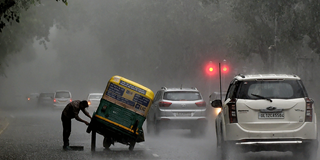As inequality continues to deepen worldwide, we do not have the luxury of sticking to the status quo. Unless we confront the inequality challenge head on – as we have just begun to do with another existential threat, climate change – social cohesion, and especially democracy, will come under growing threat.
MUMBAI – At the end of a low and dishonest year, reminiscent of the “low, dishonest decade” about which W.H. Auden wrote in his poem “September 1, 1939,” the world’s “clever hopes” are giving way to recognition that many severe problems must be tackled. And, among the severest, with the gravest long-term and even existential implications, is economic inequality.
The alarming level of economic inequality globally has been well documented by prominent economists, including Thomas Piketty, François Bourguignon, Branko Milanović, and Joseph E. Stiglitz, and well-known institutions, including OXFAM and the World Bank. And it is obvious even from a casual stroll through the streets of New York, New Delhi, Beijing, or Berlin.
Voices on the right often claim that this inequality is not only justifiable, but also appropriate: wealth is a just reward for hard work, while poverty is an earned punishment for laziness. This is a myth. The reality is that the poor, more often than not, must work extremely hard, often in difficult conditions, just to survive.

MUMBAI – At the end of a low and dishonest year, reminiscent of the “low, dishonest decade” about which W.H. Auden wrote in his poem “September 1, 1939,” the world’s “clever hopes” are giving way to recognition that many severe problems must be tackled. And, among the severest, with the gravest long-term and even existential implications, is economic inequality.
The alarming level of economic inequality globally has been well documented by prominent economists, including Thomas Piketty, François Bourguignon, Branko Milanović, and Joseph E. Stiglitz, and well-known institutions, including OXFAM and the World Bank. And it is obvious even from a casual stroll through the streets of New York, New Delhi, Beijing, or Berlin.
Voices on the right often claim that this inequality is not only justifiable, but also appropriate: wealth is a just reward for hard work, while poverty is an earned punishment for laziness. This is a myth. The reality is that the poor, more often than not, must work extremely hard, often in difficult conditions, just to survive.